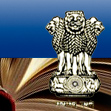Highlights the concept of contents in personality. Scores of question (item)
resources are included here as constituent models for the construction of tests &
examinations of varying length & difficulty level. They could be used for collecting
and quantifying the details of personality factors (behavioural traits)
acquired as part of all-round growth towards making objective assessment. Being built
up on a dimensional problem, every item is presented in an Item File Card (IFC)
format with bilingual instructions. The item resources prepared on each of the sub components
hierarchically listed under cognitive4.1,
affective4.2, and
psychomotor4.3
domains facilitate assessing personality in all its dimensions with sampling
error free content coverage. The academic inputs are drawn from genesis ,
generics , aesthetics , and affectives areas of literature.
Theoretical premises are explained in the introductory part. Attempted for the
first time in the discipline of literature in Indian languages, this work will serve as a
help line to those who want to construct personality tests in literature
disciplines at various levels of education .
[4.1] Cognitive domain is concerned with the process
of thinking; dimensions that are perceived in terms of six hierarchically classified objectives
of education viz., knowledge, comprehension, application, analysis, synthesis, and evaluation,
are dealt with here.
[4.2] Affective domain is concerned with the process
of feeling i.e., emotional aspects; dimensions that are perceived in terms of five hierarchically
classified objectives of education viz., receiving, responding, valuing, organisation, and characterisation,
are dealt with here.
[4.3] Psychomotor domain is concerned with the process
of action i.e., doing; dimensions that are perceived in terms of five hierarchically classified
objectives of education viz., imitation, manipulation, precision, articulation, and naturalisation
are dealt with here.


